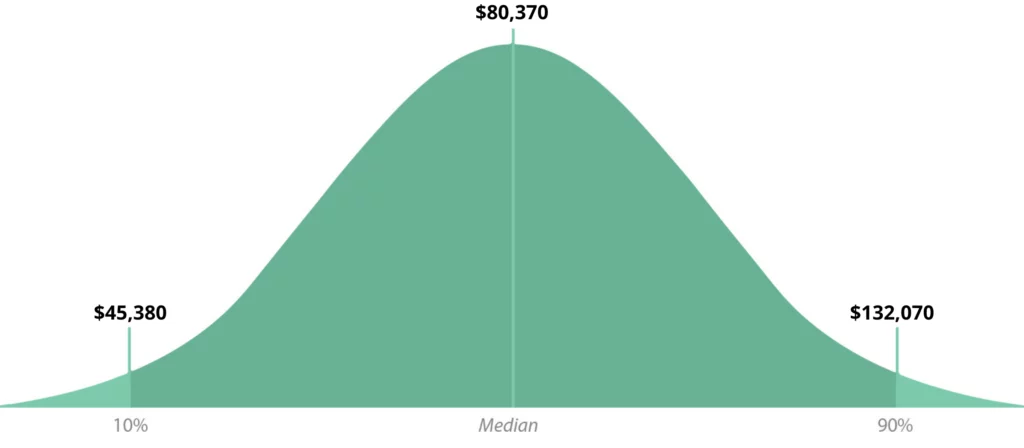
1. Overview: Job Responsibilities, Salary, and Common Requirements
2. A Comprehensive Guide to Becoming a Psychologist
3. What Does a Psychologist Do?
4. Signs You Should Consider Becoming a Psychologist
5. Things You Need to Know Before Becoming a Psychologist
6. How Do You Become a Psychologist?
7. What are the Knowledge and Skills Needed to be a Psychologist?
8. Popular Schools and Colleges in the U.S. for Aspiring Psychologist
9. How to Get a Job as a Psychologist
10. Learn About Geographic and Location Pay Differentials
11. Make Your Resume Stand Out
Psychologists made a median salary of $80,370 in 2019. The best-paid 10 percent made $132,070 that year, while the lowest-paid 10 percent made $45,380.

Marriage and Family Therapists
Physicians and Surgeons
Postsecondary Teachers
School and Career Counselors
Sociologists
Substance Abuse, Behavioral Disorder, and Mental Health Counselors
Survey Researchers
Training and Development Specialists
Communication Skills
Ethics
Patience
Empathy
Problem-Solving
Research
Numeracy
Open-mindedness
Computer Literacy
Trustworthiness
Expertise in Psychology
One in every four people in the world will get a mental or neurological problem at a certain point in their lives according to the World Health Organization (WHO). Mental illnesses are the second leading cause of deaths for 15-29-year-olds, in fact, more than 800,000 people end their own lives every year. This statistical data makes the demand for psychologists to grow exponentially.
Psychologists help these individuals cope and heal themselves through clinical counseling. There are several causes of mental illnesses, and the main responsibility of psychologists is to help them overcome what they are going through.
These health professionals carry a heavy responsibility of giving emotional support and guidance to their patients—making this profession a tough one. As difficult it may be, being a psychologist is still a rewarding career to pursue.
A psychologist is a licensed individual who studies and researches about human behavior and mental processes through observation, interpretation, and documentation of how people relate to one another and to their respective environment. Then, they use this research to improve and help the existing processes and behaviors.
A psychologist’s duties include the following:
There are many types of psychologist one could pursue to be and some of them include:
Psychology is a very interesting topic to study and provides benefits in everyday life. That’s why a lot of people find themselves pursuing a career as a psychologist. Although anyone can take up the program, not everyone is cut out for the role. To ensure you fit the role, here are some signs you should watch out for to know you are on the right track:
If you love spending time around people, the role of a psychologist will definitely work for you. Psychologists spend most of their time interacting with their patients which require energy, patience, and genuineness. Even if you get shy at times, as long as you feel invigorated when someone confides in you, your approachable personality will shine through and make you a good psychologist.
Do your friends go to you first when they have problems? Maybe that’s because you are the best person to talk to in times like this. They are at ease with your listening skills and they trust your guts. Psychologists listen to their patients for long hours without getting bored as they need to come up with the right resolutions.
Aside from listening, psychologists observe their patients often—especially when they are talking about their cases. You ought to have the curiosity and sharp observing skills to identify little details that add up to your conclusion. A keen observer does not let even the slightest detail pass up.
Open-mindedness is key to being a successful psychologist. There is no way a closed mind will work in psychology. You have to be able to respect what clients are telling you as they need to feel the sincerity of your support. So if you are somebody who is an open book and does not judge easily, you are a good fit for the role.
If you take pleasure in solving problems, you’ll have a good career as a psychologist as your main role is to help your clients solve their problems. Genuine thirst for answers and an analytical mind will help you ease your way as a successful psychologist.
The role of a psychologist involves a lot of teamwork either with your colleagues or your clients. You share the common goal after all. You should enjoy the company of others and work closely with them because you will be exposed to countless interactions.
Knowing the struggles of being depressed, you might want to give back to others and help them with their treatments. According to Kristina Randle, Ph.D. LSCW, having had depression doesn’t necessarily mean you are going to be a better psychologist than someone who has not, it is just that the fact of being healed by a therapy is what motivates them to help others find their peace, too.
Here are some things you need to consider before you pursue becoming a psychologist:
The path to becoming a psychologist takes up at least ten years of grueling education and internship. The first four years will be for your undergraduate program, followed by a 5-year graduate program. The last year will be your postgraduate training or internship.
Before embarking on this career, you need to consider this 10-year long commitment. If you are not fully decided on sticking to a career that takes years of preparation, you might need to rethink your choices.
If you think you are getting away with Math by taking a Science major, you got it all wrong. That’s because Psychology comprises quantitative components as well. Some of the core subjects that have math include “Quantitative Research Methods” and “Mathematics of Neuropsychology.”
Math skills are vital to being a psychologist. You’ll deal with statistical data from various studies, reports, experiments, and more. You ought to fully understand to quantify and interpret such data to arrive at logical conclusions.
During your undergraduate, you can complete a degree in Psychology, Mathematics, or any Science-related major. But once you enter graduate school, you need to know what exact specialty you want to major in. Some of these specializations include cognitive psychology, behavioral psychology, mathematical psychology, and more.
This is a crucial point to consider before entering graduate school as psychology is broken down into several branches.
Most people believe that psychology is about mental health. While a massive aspect of psychology centers around it, it’s more than just improving someone’s mental health. Psychology deals with a broader aspect of human behavior.
Some psychologists help organizations get better at communicating internally. Sports teams hire psychologists to help motivate and instill confidence. Industrial companies hire psychologists to help create efficient and safer products. A psychologist could offer so many services, and you need not be trapped in dealing with other’s personal problems if you don’t want that.
This information is crucial if you plan on moving states as you practice your profession. If you earned your X state license, that doesn’t mean you can practice once you move to a Y state.
This requires you to thoroughly research the state requirements when you plan on transferring to a different state. You might need to take additional classes, earn specific certifications, and do some additional work just to earn a license in the new state. If you want to check these state requirements, you can visit the American Psychological Association website.
This means that the more experience you have dealing with various psychology scopes, the better chance you have of being employed. Sometimes, being too concentrated on one field isn’t everything as some companies would prefer somebody who’s explored various interests.
Psychology is one of the most popular degrees to take up in college. This means that there is more competition in terms of excelling, getting recognized, and receiving personal recommendations. This also means that you have lots of classmates sitting in one class if your college is pretty big. This makes it hard to stand out in a sea of young minds.
But you don’t have to worry about being lost as you grind against a huge crowd. You just really need to instill that dedication to study hard and get to graduate school.

So how does an aspiring psychologist land the profession? It requires a series of requirements you have to follow in order to successfully deserve the title. These are the qualifications you need to meet before you can practice in the field:
Medical professions are very specific to their educational requirements. An undergraduate degree of either Bachelor of Arts (BA) or Bachelor of Science (BS) in Psychology is a major prerequisite in order to move forward to internships and doctorate degree.
The next step to becoming a psychologist is pursuing a master’s degree. This usually lasts for two years. While it opens up some opportunities to psychology, it is still not enough to fully exercise the practice of becoming a psychologist. Programs start to be more specialized in this level as the field of psychology is undeniably broad.
Most psychologists are required to have a Doctor of Philosophy (Ph.D.) or a Doctor of Psychology (Psy.D.) to fully meet the educational requirements on becoming a psychologist. Ph.D. focuses more on research and is more traditional, whereas Psy.D. lets you practice on your own. It takes up 4-7 years of studying to finish a doctoral degree. You will be concentrating on the specialization you want which typically include:
Internships and supervised clinical experience are your next big step to secure your license. The required duration of time will vary per state which are all stated at the Association of State and Provincial Psychology Boards (ASPPB). This is imposed as a strict requirement in garnering your license. During this training, you will apply the knowledge you have learned from years of studying while gaining new learnings from real-world experience.
In order to finally secure a license, you shall pass the board examination in your state. All the requirements and details about the board examination are listed in ASPPB. Each state’s requirements vary because they have their own set of limitations and laws, so it’s better to check them ahead of time.
Psychologists who engage in specialty practice are encouraged to get certified. Not only does this boost their credential, but it demonstrates competence in the specialty areas. For certifications like this, psychologists may get them from associations like American Board of Professional Psychology for 15 areas of psychology and the American Board of Clinical Neuropsychology for neuropsychology.
The success of a psychologist will always depend upon the expertise he has equipped within himself. Here are the knowledge and skills that any successful psychologist has:
A curious mind should be innate to a psychologist. As someone who spearheads research, the thirst for knowledge should be genuine. You will also be doing a lot of inquiries to your potential patients which is a fundamental part of your job. A psychologist’s role demands someone who never stops learning.
As you gather information from various sources, you should be able to draw up logical conclusions. You will be interpreting your patient’s concerns most of the time, so your mind should be sharp and critical.
Psychologists work with a number of colleagues which require them to develop a good relationship with one another, especially when conducting research. Additionally, if your specialization is more clinical in nature, you are bound to talk to your patients for hours. You need to get along with them and earn their trust as you go on with your sessions.
As part of the assessment of a client’s condition, critical observation skills are needed to identify any diagnosis. Upon conversing with a client, you should be able to observe non-language factors that will contribute to your conclusion.
In order to help your patients cope with their problems, you will come up with the best resolution that targets their concern. A competent psychologist should be able to properly assess, design, and implement a treatment program for his patients.
Awaiting progress and conclusions take up a lot of time. A good psychologist knows the value of patience for everything is not measurable. Demonstrating patience also counts in sessions with your clients as you always have to contain yourself and remember your role as the support.
Your patients need to guarantee that you are someone trustworthy. They are telling you their deepest secrets and they need you to be someone who will understand. Compassion and empathy play a big role in helping your patients feel at ease. Staying an open mind to whatever that comes into play is also vital to add in the mix of characteristics you need to have.
Just because you are dealing with medical terms, doesn’t mean you are steering clear of numbers. Frequent research requires you to understand and analyze numerical data you have gathered—making it easy for you to interpret and provide conclusions.
Lastly, your competence in the field will be displayed once you have garnered your license. You would not have conquered all those grueling years of studying and passed the board examination if you have not proven your expertise in the field.
Here is the Niche’s list of the best schools for psychology in 2021 based on key statistics and student reviews from the US Department of Education.

Securing a license won’t guarantee you a job that lands on your lap. Of course you still have to make an effort on applying for job postings you want. To help you secure your first official role and score a job, here are some tips you should remember:
One of the best ways to find a job is to check on your professional acquaintances who can refer you to a job opening. This network consists of your previous professors and advisors you met on your internship. So it’s a good habit to always keep in touch with people who will help you grow your career.
Look at the local job listings or companies you see yourself in. You can check out the local yellow pages or online listings in your area to see if there are any available jobs that fit your specialty, qualifications, and preferences. This way, you can ensure that the job you are pursuing is a perfect match for you.
Career fairs happen every once in while at a prominent location in your area. This kind of event is a great way to scout any job opportunity as you have a lot of choices and you are face-to-face with them all at the same time. It’s a good practice to watch out for job fairs through browsing their sites online:
Job portals are your most convenient option when seeking job opportunities. You have a lot of opportunities you can choose from as there are thousands of clinics, hospitals, schools, and other industries that post their job openings online. Here are some of the most popular online job websites you can check out:
A few online websites are specifically created to offer job opportunities for psychologists. Here are a few of them:
The wage of psychologists varies per location. To know how much they make annually, here is a complete list of the average pay they received in 2019 according to BLS.
| State | 2019 Mean Annual Wage |
|---|---|
| Oregon | $112,010 |
| California | $111,750 |
| New York | $96,170 |
| Louisiana | $96,040 |
| New Jersey | $95,680 |
| Colorado | $92,840 |
| Connecticut | $92,790 |
| North Dakota | $92,370 |
| Goergia | $90,760 |
| Michigan | $90,700 |
| Massachusetts | $90,180 |
| New Hampshire | $89,000 |
| Virginia | $88,880 |
| Utah | $88,480 |
| Wisonsin | $86,920 |
| Pennsylvania | $85,170 |
| Minnesota | $84,550 |
| Rhode Island | $84,120 |
| Alaska | $82,770 |
| Nevada | $83,280 |
| Iowa | $83,090 |
| Missouri | $81,700 |
| Indiana | $80,750 |
| Maine | $80,700 |
| North Carolina | $80,670 |
| State | 2019 Mean Annual Wage |
|---|---|
| Delaware | $80,060 |
| Maryland | $79,870 |
| Wyoming | $78,620 |
| Tennessee | $78,270 |
| Washington | $77,700 |
| South Dakota | $77,560 |
| Florida | $77,460 |
| Ohio | $77,440 |
| Illinois | $75,050 |
| Texas | $73,920 |
| New Mexico | $73,550 |
| Arkansas | $73,050 |
| Mississippi | $72,470 |
| Nebraska | $71,130 |
| Vermont | $70,120 |
| Kansas | $69,530 |
| Alabama | $69,190 |
| South Carolina | $68,040 |
| Kentucky | $66,940 |
| Oklahoma | $66,400 |
| Arizona | $65,400 |
| Montana | $64,160 |
| Idaho | $60,880 |
| West Virginia | $54,780 |
| Hawaii | - |
Report from the Bureau of Labor Statistics
A well-constructed resume creates a remarkable impression to employers. Make sure you craft yours with the utmost effort. Here are some tips to make sure your resume stands out among a pile of other candidates:
A precise and well-constructed objective will give them an overview as to how you tick as an employee. Write at least 3 sentences describing your goals, experience, and where you see yourself in the future. Lastly, make sure that what you state is aligned to their company goals to add that extra point of being the perfect match to their company.
Time to introduce them to your skillset and knowledge you’ve earned. Strike a good impression by listing down your qualities—both soft and hard skills. Also, do not be shy to show off any exceptional expertise that you can be proud of. Remember to align your skillset to the needs and requirements of the employer to amplify your chance of getting hired.
Most types of psychologists are required to pass the board examination in order to practice. Highlight these credentials on your resume as it is probably the major qualification of the job you are applying for. Plus, do not forget to add the post-nominal title (Ph.D. or Psy.D.) on your name.
Though it is not a requirement, most psychologists get certifications for their specialty to prove their competence. As much as you can, try to get them to boost your credentials and demonstrate an exceptional skillset.
Your internship and previous experience say a lot about you. Any experiences you have acquired in the past matter, especially for your first official job. You want to show them your training that has molded your expertise. Ensure to write a brief rundown of what you have learned during that experience.
As a psychologist, you have spent an enormous amount of time specializing in the study. It’s time to showcase that hard work by enumerating each level of educational attainment you have. From your bachelor’s degree, associate or master’s degree to your doctorate degree, list them down! Most psychologists are required to obtain a license which makes these compulsory.
As you have passed your licensure exam, you are bound to be networked with professional associations that can help you grow your career. Being an active member pays off to your credentials because being associated with these kinds of organizations contribute to your progression.
Here are some of the professional organizations you could list down on your resume:
To top everything off, make sure you include professional contacts in case your potential employer wants to know your background working with other people. You can put your former professors, advisers, and previous colleagues. Let these people know that you have put them in your resume so that they won’t be surprised when they get a random call from an employer asking about you.
So you’ve secured your coveted interview–how do you prepare for the questions now? Interviews have a way of making people feel nervous even if they know they fit the role. To guide you on how to properly answer questions related to your specialty, here is a quick guide to answer specific questions for psychologists:
This question wants to know how you interact with people in the same environment you are in. Being a psychologist, you will be spending lots of time co-working with colleagues and talking to your clients or patients. They expect you to be a people person.
To answer this, describe your qualities that point out how good you are with being around people. Gather up some instances that will demonstrate how you build relationships with people in your work. You should be able to emphasize that people relate to you and they feel comfortable with you around.
A psychologist should be aware of the elemental abilities he needs to instill within himself. The interviewer wants to verify your self-awareness as being a successful professional starts with understanding your own role.
The best answer you can come up with is stating both hard and soft skills. Cite them individually and describe briefly how it relates to your job. You should always include skills like data analysis, problem-solving, decision-making, interpersonal skills, and of course, your knowledge in psychology.
The interviewer seeks to know the expertise they can be of value to them. This question is always asked to know how much of a good fit you are for the role, thus, you need to elaborate the skillset that matches them.
Give them an ample overview of what you know by sharing your knowledge with various specialties of psychology, the experiences you’ve had, the learnings that have contributed to your expertise, and the skills that you think are your best. Enumerate your best assets and back them up with circumstances that’ll prove your adeptness in them.
One of the expected responsibilities from you is providing support to your clients. In most of your sessions, you will be dealing with various cases, but all will conclude to giving them the motivation they need. So how do you do that?
First, you should follow the method of assessing, interpreting, and recording their behavior. When you are done identifying the root cause of it all, you can now turn to the treatment plan and strengthen their mindset with words of encouragement. You need empathy, compassion, and patience to understand what kind of motivational support they need.
A continuing education not only proves your desire for career growth, but it also displays your plan to stay in the field for a long time. Employers want to confirm how invested you are with yourself and they will be betting on you if they have proven you are worth it.
Share your plans with your interviewer. If you have not considered pursuing any form of continuing education, tell him so. It’s okay not to have any plans as of the moment, but you should explain that you that you will be considering it in the near future. Remember, it’s a good investment to expand your knowledge as this shows your passion for the field.
Sharpen your skills in psychology by taking these top online courses
Here are some of Skill Success’ top Psychology programs that will help you get started on the field:









